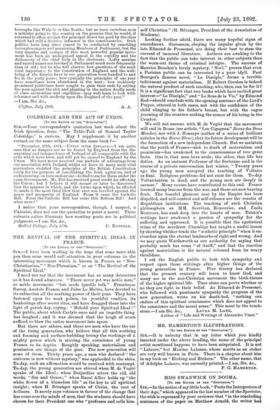THE REVIVAL OF THE SPIRITUAL IDEAL IN FRANCE.
[To THE EDITOR OF THE "SPECTATOR."] SIR, —I have been waiting in the hope that some more able pen than mine would call attention in your columns to the interesting movement which is known in France as " Neo- Christianism," " Neo-Platonism," or as " The Revival of the Spiritual Ideal."
I need not say that the movement has as many detractors as it has found admirers. " There never yet was noble man," or noble movement, "but made ignoble talk." Francisque Sarcey, Anatole France, and Jules Le Maitre, have devoted to its extinction all the scathing power of their pens. They have fastened upon its weak points, its youthful vanities, its hankerings after secret rites, and have dragged these into the light of garish day, crying : " Behold your Spiritual Ideal !" The public, about which Carlyle once said an impolite thing has laughed ; and it was deemed that the laugh of scorn sufficed to blow the entire movement into space.
But there are others, and these are men who have the ear of the rising generation, who believe that all this seething and foaming and surface-bubbling betray the workings of a mighty power which is stirring the conscience of young France to its depths. Roughly speaking, materialism and pessimism are things of the past. The new generation will none of them. Thirty years ago, a man who declared " the universe is now without mystery," was applauded to the skies. To-day, such an affirmation would be received with contempt. To-day, the young generation are stirred when M. de Vogiie speaks of the Ideal ; when Desjardins utters the old, old words, " Sin and Grace; " when Raoul Allier holds up " the white flower of a blameless life" as the key to all spiritual insight ; when H. Beranger speaks of Christ, the root of holiness. It surely says volumes in favour of the change that has come over the minds of men, that the students should have chosen for their President one who " professes and calls him-
self Christian" (H. Beranger, President of the Association of Students).
Looking further afield, there are many hopeful signs of amendment. Statesmen, obeying the impulse given by the late Edmond de Pressense, are doing their best to stem the current of immoral literature. Authors are awaking to the fact that the public can take interest in other subjects than the worn-out theme of criminal intrigue. The success of Maurice Bouchor's lovely mystery, "Noel," proves that even a Parisian public can be interested by a pure idy1L Paul Bourget's famous novel, " Le Disciple," forms a terrible indictment against materialism. If Robert Greslon is indeed the natural product of such teaching, who, then, can be for it P It is a significant fact that two books which have excited great interest—"Le Disciple," and "Le Sens de in Vie," by Edmond Rod—should conclude with the opening sentence of the Lord's Prayer, uttered in both oases, not with the confidence of the child clinging to his father's breast, but with the vague yearning of the creature seeking the source of his being in the Creator.
We will not assume with M. de Vogue that the movement will end in Rome (see article, "Les Cigognes," Revue des Deux Mondes), nor with J. Honsaye (author of a series of brilliant articles in the Revue Bleue), that its future development will be the formation of a new independent Church. But we maintain that the youth of France—sick to death of materialism and pessimism—has awakened to the consciousness of two great facts. One is, that men have souls ; the other, that life has duties. As an eminent Professor of the Sorbonne said in the course of a private conversation last winter, " Twenty years ago the young men accepted the teaching of Voltaire as final. Religious problems did not exist for them. To-day Voltairianism is dead, and the young men are deeply in earnest." Many causes have contributed to this end. France learned many lessons from the war, and these are now bearing fruit. The baneful glamour cast by the Empire has been dispelled, and self-control and self-reliance are the results of Republican institutions. The teaching of such Christian philosophers as MR. Seeretan, Renouvier, and Emile Boutroax, has sunk deep into the hearts of men. Tolstoi's writings have awakened a passion of sympathy for the suffering and oppressed. It is possible that the egotistical crime of the murderer Chambige has taught a useful lesson by showing whither tends the " nsthetic principle " when it en- croaches upon the eternal landmarks of right and wrong. And we may quote Wordsworth as our authority for saying that probably much has come "of itself," and that the reaction against materialism is the natural rebound from its weary thralldom.
I ask the English public to look with sympathy and respect upon these strivings after higher things of the young generation in France. Pere Gratry has declared that the present century will learn to know God, and many see in the neo-Christian movement the birth-throes of the higher spiritual life. Time alone can prove whether or no they are right in their belief. As Edmond de Pressense, who followed with passionate sympathy the progress of the new generation, wrote on his death-bed, "nothing can endure of this spiritual renaissance which does not appeal to the conscience and the moral sense." This must be the touch-
Author of "Life and Writings of Alexandre Vint."


































 Previous page
Previous page